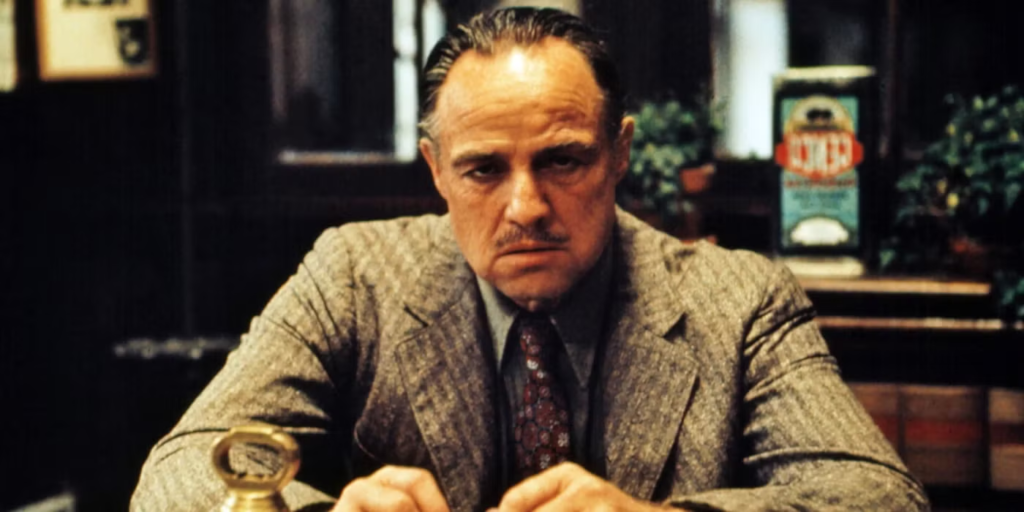Marlon Brando, often hailed as one of the greatest actors of all time, transformed the craft of acting and ushered in a new era of naturalism in cinema. Known for his intensity, charisma, and groundbreaking performances, Brando left an indelible mark on Hollywood. From his electrifying role in A Streetcar Named Desire to his iconic portrayal of Don Vito Corleone in The Godfather, his career spanned decades, cementing his legacy as a trailblazer in film. Let’s explore the life, career, and lasting impact of Marlon Brando.
Early Life: A Troubled Genius
Marlon Brando Jr. was born on April 3, 1924, in Omaha, Nebraska, into a family fraught with challenges. His father was a traveling salesman with a volatile temperament, and his mother, an actress and artist, struggled with alcoholism. Despite these difficulties, Brando showed early signs of creativity and rebellion.
As a teenager, Brando was sent to military school but was expelled for insubordination. He moved to New York in the 1940s to study acting under Stella Adler at the Actors Studio, where he immersed himself in the Method Acting approach. This technique, which emphasized emotional authenticity, would become a cornerstone of his performances.
Brando’s early struggles and commitment to his craft laid the groundwork for his transformative influence on acting.

Breakthrough Performance: A Streetcar Named Desire (1951)
Brando’s performance as Stanley Kowalski in the film adaptation of Tennessee Williams’s A Streetcar Named Desire was nothing short of revolutionary. His raw, magnetic portrayal of the brutish yet vulnerable character captivated audiences and critics alike. The role earned him his first Academy Award nomination and solidified his place as a leading man in Hollywood.
Brando’s Stanley Kowalski became a cultural phenomenon, changing the way masculinity was portrayed on screen.

The Peak of Stardom: On the Waterfront and The Godfather
In On the Waterfront (1954), Brando delivered one of cinema’s most memorable performances as Terry Malloy, a washed-up boxer turned dockworker. The line, “I coulda been a contender,” became legendary and earned Brando his first Academy Award for Best Actor.
Nearly two decades later, Brando reinvented himself yet again with his portrayal of Don Vito Corleone in The Godfather (1972). His nuanced, understated performance brought depth to the mafia patriarch, earning him another Academy Award, though he famously refused it in protest of Hollywood’s treatment of Native Americans.
Brando’s roles in On the Waterfront and The Godfather showcased his unparalleled ability to portray complex, multifaceted characters.

Activism and Personal Struggles
Beyond acting, Brando was an outspoken activist. He used his platform to advocate for civil rights, Native American rights, and environmental causes. However, his personal life was often tumultuous, marked by failed marriages, strained relationships, and financial troubles.
Despite his struggles, Brando remained an enigmatic figure who never shied away from challenging societal norms or the Hollywood system.
Brando’s activism demonstrated his commitment to social justice, cementing his legacy as more than just an actor.

Legacy: The Actor Who Changed Everything
Marlon Brando’s influence on cinema is immeasurable. He inspired generations of actors, including Robert De Niro, Al Pacino, and Leonardo DiCaprio, who credit him with revolutionizing the craft of acting. His ability to channel deep emotional truth and his refusal to conform to Hollywood norms made him a legend.
Even years after his passing in 2004, Brando’s work remains a benchmark for excellence in acting, and his legacy continues to inspire artists worldwide.
Brando’s revolutionary approach to acting forever changed the landscape of cinema.

Conclusion: An Everlasting Legacy
Marlon Brando was more than an actor; he was a force of nature who redefined what it meant to perform. From his electrifying on-screen presence to his off-screen activism, he lived life on his terms, leaving behind a legacy that transcends generations. Brando will always be remembered as a true artist who changed the face of Hollywood.
